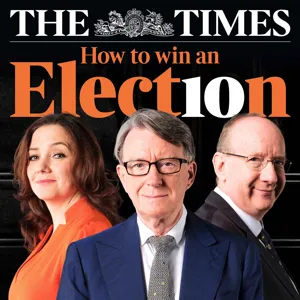Podcast Summary
Political missteps: Political missteps, even if unintentional, can create narratives and amplify existing issues, potentially impacting public perception and momentum.
Political missteps, even if unintentional, can significantly impact an election campaign. The recent controversy surrounding Rishi Sunak's decision to attend the D-Day commemoration while under criticism for gaffes and miscalculations serves as a reminder of this. While individual mistakes may not always determine the outcome of an election, they can create narratives and amplify existing issues, potentially impacting public perception and momentum. It's crucial for political figures to consider the symbolism of their actions and be mindful of the potential consequences.
Political errors: Political errors, no matter how small, can have significant consequences and should be avoided through careful planning and effective communication.
Political errors, even those that may seem incomprehensible at first, can have significant consequences. The decision to send David Cameron to an EU summit instead of a Conservative representative was surprising and led to an apology. These errors often become more magnified when a leader is under pressure. Being a good constituency politician can make a difference, especially for minority parties, but it may not be the sole factor in reelection. The speaker also touched on the importance of learning from these mistakes and preventing them in the future. Overall, the discussion emphasized the importance of careful planning and effective communication in politics.
Local influence vs Election swing: Local MPs' personal followings and reputations can impact election outcomes, but the larger trend of the election swing determines the final results, with the impact being more noticeable during the first terms.
Local MPs' personal followings and reputations can significantly influence election outcomes, but the swing of the election tides often determines the final results. Margaret Thatcher's interaction with a newly elected Conservative MP, Jeremy Hansley, illustrates this concept. Hansley won his seat by a small margin and attributed his victory to Thatcher's support in his constituency. However, Thatcher emphasized that she was responsible for the larger number of votes. The local impact can be more noticeable during a politician's first terms, but the trend tends to level off. In the upcoming election, a few local MPs might survive based on their reputations, but the overall outcome will depend on the election swing. This concept is particularly relevant for politicians in challenging situations, such as Jeremy Corbyn, who might be able to win despite being excluded by their party due to a strong local reputation. Overall, local influence plays a role, but the election outcome is largely determined by the swing of the election.
Australian political strategies: Studying other countries' political strategies, like Australia's use of TV ads and robust language, can provide effective insights and influence public opinion and elect leaders, but cultural differences and nuances must be considered
There are valuable insights to be gained from studying the political strategies and systems of other countries, such as Australia. These strategies can sometimes be more effective in a particular context than those used in one's own country. For instance, the use of television advertising and robust political language in Australian elections have been successful in moving public opinion and electing leaders. Additionally, the reputation of certain policies or systems, such as Australia's points-based immigration system, can also influence public perception and support. However, it's important to note that not all strategies translate perfectly across borders, and cultural differences and nuances must be taken into account. In the case of the UK, rural areas may not be as frequently canvassed on the doorstep due to logistical challenges and the focus on urban constituencies.
Canvassing effectiveness: Canvassing is a crucial part of political campaigns for identifying supporters and introducing candidates to voters, but its effectiveness relies on finding supporters to vote on election day and demonstrating care, despite practical constraints and challenges reaching every household.
Canvassing, an essential part of political campaigns, is a labor-intensive process aimed at identifying supporters and introducing candidates to voters. However, it's challenging to reach every household due to limited resources and declining party membership. People may perceive a lack of interest if they're not visited, but it's more about practical constraints. The effectiveness of canvassing relies on finding supporters to vote on election day and demonstrating care. Despite its challenges, parties continue to invest in canvassing as it plays a crucial role in elections. Unfortunately, even bringing in high-profile figures like Penny Morden as a leader might not significantly improve the situation for a struggling party like the Conservatives, who faced issues long before their recent leadership changes.
UK political instability vs Labour stability: Despite UK political instability, exploring historical figures through podcasts like 'Your History' can offer valuable insights and perspective
The political landscape in the UK is experiencing uncertainty, with the possibility of defections from the Conservative Party before the candidate deadline. This instability is being contrasted by Labour's promise of stability under their leadership. However, the conversation also touched upon the upcoming podcast "Your History" from The Times, which explores the lives of notable figures from the obituaries section. The podcast, sponsored by Ancestry, aims to provide listeners with a deeper understanding of the impactful lives that have shaped our history. In essence, the political climate is uncertain, but delving into history can offer valuable insights and perspective.

